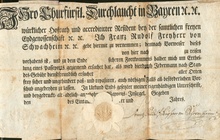Franz Rudolf von Schwachheim
Franz Rudolf von Schwachheim (baptized December 20, 1731 in Bern , † October 9, 1804 in Munich ), Baron von Schwachheim since 1770 , was a Bavarian diplomat of Swiss origin.
Life
Doctor and lawyer
His parents were from Hannover originating pharmacist Franz Daniel weak home and his wife Marianne Wyttenbach , a pharmacist daughter from the Bernese patrician . Schwachheim became a citizen of Lausanne in 1736 . He attended high school and the academy there . Then he studied at various German universities, probably first law , then medicine ; The latter, among others, with Albrecht von Haller in Göttingen, Hanover .
As a student he entered the service of the House of Bavaria in 1755 : like his father, he became the personal physician of Cardinal Johann Theodor of Bavaria and of Clemens Franz Herzog in Bavaria . In 1757 he received his doctorate in the Prussian town of Halle with a dissertation on cobalt for Dr. med. In the same year he joined a Masonic Lodge . In 1758 his father bought Bad Schinznach in the Bernese Aargau . In 1759 Schwachheim was accepted into the Imperial Academy of Natural Scientists Leopoldina in Halle.
Envoy in Schaffhausen and Berlin

In 1763 he married Maria Josepha Reichsfreiin von Bossi von Löwenklau (approx. 1739–1789), who was led by Elector Maximilian III. Joseph was sponsored by Bavaria . On this occasion , he probably converted to Catholicism . In 1767 he became a real councilor , that is, a member of the highest judicial authority in Munich. After Duke Clemens Franz's death, the Elector appointed him a resident of the Swiss Confederation based in Schaffhausen in 1770 . At the same time, his father and uncle Dr. med. Gabriel Franz Schwachheim with her descendants the title of baron .
In 1772 he was sent to the court of Frederick II of Prussia as Bavarian minister . His most important task was to avert an imperial war against Bavaria . Maximilian III Joseph tried to take advantage of the hunger crisis of 1770–1772 to make the imperial city of Regensburg , where the Reichstag was located, compliant. The successful mission in Berlin , which lasted until 1774, represented the high point of Schwachheim's career . Since he had to pay for his expenses himself, he lost all of his fortune during this time. The hope for the inheritance of his relative Joseph Peter Graf von Schwachheim (1707–1775), former imperial-royal ambassador to Constantinople , did not come true.
Of child abuse accused

In 1775 he returned to Schaffhausen with the titles of privy councilor and minister. But in 1778 the embassy in Switzerland was canceled by the new Elector Karl Theodor and Schwachheim retired. As a befitting residence for him, his father then acquired the Baldingen and Böbikon rule in the county of Baden .
Before Schwachheim left Schaffhausen, it became public that in 1776 he had raped the then 11 or 12-year-old housekeeper Anna Katharina Gäschlin. At his urging, the city council issued him a clean bill of health - probably in the interest of the profitable salt trade with Bavaria . He sentenced the alleged victim and his widowed mother to four weeks in prison for defamation, the latter also to eight years in exile . The interrogation protocol had previously been processed (see illustration).
Higher regional government council in Munich
In 1780 Schwachheim applied unsuccessfully for the position of Bavarian ambassador to the Swabian Empire . It was not until 1781 that the elector took him back into active civil service as a real councilor of the higher regional government based in Munich. He did not receive the required compensation for his expenses in Berlin and for the abolition of the legation in Switzerland.
In Munich, Schwachheim joined a circle whose members, like his father, made alchemical experiments . On the other hand, he took part in an attempt to save firewood, carried out by Karl Theodor's favorite, Count Rumford . When Maximilian IV Joseph took office in 1799, he was retired.
Of the legitimate children of Schwachheim, Rudolf (date of birth unknown) fell as a Bavarian lieutenant in 1800 near Hohenlinden . Of the three daughters, Eleonore (1766–1842) married Anselm Freiherr von Osterberg (1750–1823). Josephine (1776–1832) and Augusta (1780–1848) remained single. The illegitimate son Daniel (1760-1828) received a craft training and had to be supported in old age by his home community Lausanne.
literature
- Peter Genner: The hosts of the Helvetic Society. The Schwachheim-Renner family as the owners of Bad Schinznach and their emigration to Bavaria. In: Argovia. 2012, pp. 126–179 ( digitized version ).
Individual evidence
- ↑ Inaugurale specimen physico-chemicum, cobalti historiam, producta et novas quasdam species exhibens. Halæ Magdeburgicæ 1757.
- ^ Member entry of Franz Rudolph Joseph von Schwachheim at the German Academy of Natural Scientists Leopoldina , accessed on January 5, 2017.
| predecessor | Office | successor |
|---|---|---|
|
Bavarian envoy to Switzerland 1770–1772 1775–1778 |
1803: Johann Baptist von Verger | |
|
Bavarian envoy to Prussia 1772–1774 |
1800: Aloys von Rechberg |
| personal data | |
|---|---|
| SURNAME | Schwachheim, Franz Rudolf von |
| ALTERNATIVE NAMES | Schwachheim, Freiherr von |
| BRIEF DESCRIPTION | Bavarian diplomat of Swiss origin |
| DATE OF BIRTH | before December 20, 1731 |
| PLACE OF BIRTH | Bern |
| DATE OF DEATH | October 9, 1804 |
| Place of death | Munich |


